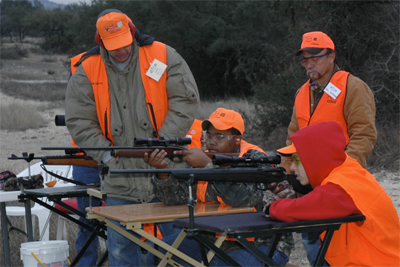Hunter Ed: Proposed Changes on Horizon
This is Passport to Texas
People of all ages take Hunter Education, but…
09— For the most part it tends to be that middle-aged, young professional who wants to try hunting; they want to eat local – if you will – and know where their food source is coming from.
Robert Ramirez oversees the program. The certification class is mandatory for those born on or after September 2, 1971. Currently it’s two days and ten hours of classroom instruction or home study with a field day. Yet, Ramirez says there’s a proposal to add more options.
07— We’re going to embrace the technology that’s out there. It’s dynamic; it’s no longer a static webpage where you’re just reading text.
The interactive program offers online skills tests – much like online learning technologies found on the internet currently. Opportunities also exist beyond the computer screen.
18— We’re going to offer some follow-up activities: mentored hunts, wildlife 101 type courses utilizing our wildlife staff, inland fisheries locations, state park locations, law enforcement … to have a follow up activity to the basic hunter education course that is optional.
The public can help shape the future of Hunter Education.
15— They’ll have the opportunity for comment on our Hunter Education proposal. And at that point, I encourage them to evaluate the changes, because the commission will rule in August.
There’s more information on the Texas Parks and Wildlife website.
That’s our show for today…with funding provided by Chevrolet, supporting outdoor recreation in Texas; because there’s life to be done.
For Texas Parks and Wildlife…I’m Cecilia Nasti.



 Passport to Texas is a
Passport to Texas is a  Passport to Texas is made available by:
Passport to Texas is made available by: